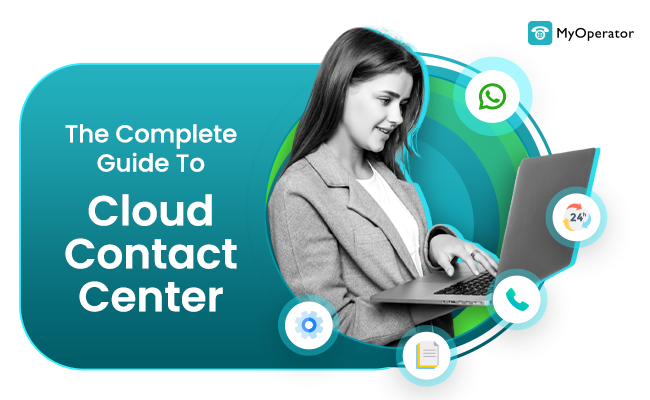Does it make sense to say that Cloud Contact Center is capable of skyrocketing your business to the next level? Guess it should, because it’s true!
With the ability to deliver exceptional customer experiences through seamless omnichannel support, advanced analytics, and remote accessibility, Cloud Contact Centers stand as an ideal and sought-after service for big enterprises.
According to future predictions, the global market for Cloud-based Contact Centers is expected to experience manifold growth in the next five years.
Table of Contents
- What is a Cloud Contact Center?
- How Cloud Contact Centers Operate – Step by Step Process
- Technology Behind Cloud Contact Center
- The Significance of Cloud Contact Center SaaS a.k.a CCaaS
- On-premise Call Center Vs Cloud Contact Center
- Best Use Cases of Cloud Contact Center
- VoIP-based Cloud Contact Center – The Best CCaaS To Amplify Your Business
- MyOperator Cloud Contact Center + VoIP offers
- Case Studies: How Emerging Brands are Scaling with Cloud Contact Center Service
- Frequently Asked Questions
Cloud Contact Centers, with rapid growth and impressive statistics, substantiate that cloud-based technology can revolutionize communication in organizations. They are capable of establishing a thriving ecosystem that facilitates seamless customer interactions, boosts operational efficiency, and drives unparalleled business growth.
So, now is a better time than ever to understand everything about Cloud Contact Centers and reap their benefits for rapid business growth.
Read the full article to learn more about Cloud Contact Centers, their benefits, best practices, use cases, and MyOperator’s unparalleled VoIP-based Cloud Contact Center service.
What is a Cloud Contact Center?
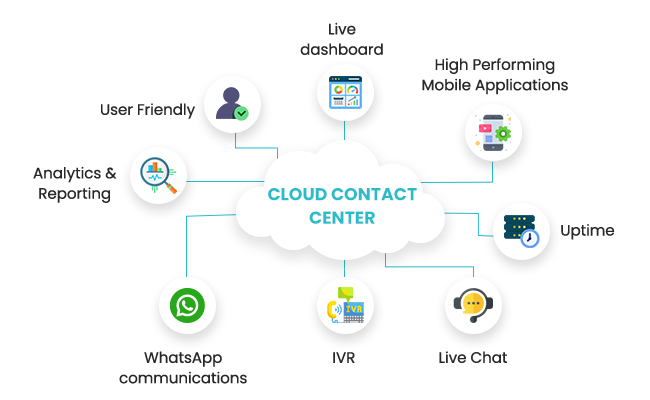
The Cloud Contact Center software, also known as CCaaS (Cloud Contact Center as a Service), serves as a vital hub for businesses to effectively communicate with their customers.
This innovative solution leverages cloud hosting and administration to enhance scalability and customer efficiency.
By functioning as a centralized communication system, it offers a comprehensive suite of tools and services for seamless inbound and outbound interactions over the internet. By functioning as a centralized communication system, it offers a comprehensive suite of tools and services for seamless inbound and outbound interactions over the internet. You can run it on a standard hosting server or on your Ubuntu VPS if you prefer so.
Utilizing advanced algorithms and omnichannel routing techniques, the Cloud Contact Center efficiently transfers customer queries to appropriate third parties, facilitating faster resolutions.
Moreover, CCaaS possesses the unique capability to manage and provide a unified view of customer interactions, enabling businesses to deliver exceptional service.
True to its name, the Cloud Contact Center conducts calls through internet connectivity, liberating companies from concerns regarding software or hardware infrastructure.
Cloud Contact Center technology empowers businesses to operate without interruption, employing various channels such as SMS, phone, WhatsApp API, and social media to streamline customer communication.
Notably, the Cloud Contact Center is renowned for its cost-effectiveness and high efficacy, making it an appealing solution for organizations.
The rise of Cloud Contact Centers has fundamentally transformed the landscape of customer service.
The cloud-based solutions offer businesses the scalability, flexibility, and advanced functionalities required to meet the ever-increasing customer expectations.
With enhanced cost efficiency, seamless omnichannel experiences, advanced features, and integration capabilities, Cloud Contact Centers have become indispensable for organizations striving to deliver exceptional customer service. As businesses continue to embrace digital transformation, Cloud Contact Centers will undoubtedly play a pivotal role in shaping the future of customer interactions, empowering organizations to thrive in the competitive business landscape
How Cloud Contact Centers Operate – Step by Step Process
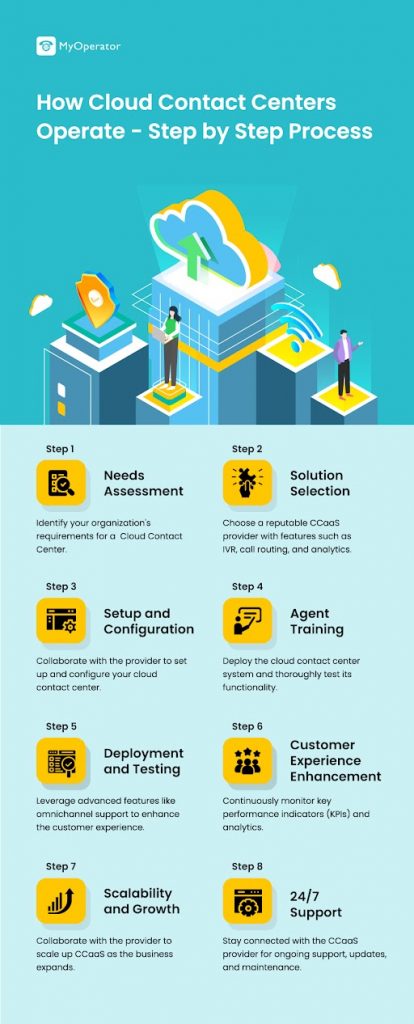
1. Acute Assessment
To successfully implement a cloud contact center, start by assessing your organization’s communication needs. Evaluate whether a cloud contact center aligns with your requirements and can effectively address your communication challenges.
2. Solution Selection
When selecting a cloud contact center solution, opt for a reputable provider that matches your business objectives. Ensure the chosen solution offers essential features like IVR, call routing capabilities, and analytics to meet your specific requirements.
3. Setup and Configuration
During the setup and configuration phase, work closely with the chosen provider to establish and configure your cloud contact center. This collaboration ensures smooth integration with your existing systems and workflows, enabling a seamless transition to the new solution.
4. Agent Training
Provide comprehensive training to your agents on effectively utilizing the tools offered by the cloud contact center. This includes instruction on call handling, customer management, and reporting features, empowering agents to deliver exceptional customer service.
Talk with our experts to find the most suitable choices for your business.
Don’t settle for less, let MyOperator help you.

5. Deployment and Testing
Deploy the cloud contact center system and thoroughly test its functionality, ensuring proper call routing, recording, and reporting.
6. Customer Experience Enhancement
Leverage advanced features like omnichannel support, self-service options, and intelligent routing to enhance the customer experience and improve satisfaction.
7. Performance Monitoring
Continuously monitor key performance indicators (KPIs) and analytics provided by the cloud contact center, such as call volumes, wait times, and agent productivity.
8. Continuous Improvement
Analyze data and feedback to identify areas for improvement. Implement necessary adjustments to optimize the performance of your cloud contact center
9. Scalability and Growth
As your business experiences growth and expansion, it is essential to work closely with your cloud contact center providers to ensure scalability. This means collaborating to increase the capacity of the contact center to handle higher call volumes and accommodate the growing demands of your customer base.
Additionally, it involves considering the addition of new features and functionalities that align with your evolving business needs and goals. By proactively addressing scalability, you can effectively support the growth of your business while maintaining excellent customer service and satisfaction levels
10. Ongoing Support and Maintenance
Maintaining a strong connection with your cloud contact center provider is crucial for continuous support, updates, and maintenance. Regularly engaging with them guarantees the system’s reliability and ensures it stays up to date with the latest advancements and features.
Technology Behind Cloud Contact Center
Cloud Call Centers software operate on cloud computing technology.
Cloud computing refers to the delivery of computing services, including storage, processing power, and software applications, over the internet
This technology allows businesses to access and utilize resources and services remotely, without the need for on-premises infrastructure.
The key technologies that enable the operation of Cloud Contact Centers are as follows
a) Software as a Service (SaaS)
Cloud Contact Centers often operate as Software as a Service. SaaS providers deliver contact center software applications over the internet, eliminating the need for businesses to install and maintain software locally.
Contact center agents and managers can access the software through web browsers, enabling remote and flexible work arrangements.
b) Infrastructure as a Service (IaaS)
Cloud Contact Centers utilize the infrastructure provided by IaaS providers. IaaS delivers virtualized computing resources, including servers, storage, and networking infrastructure, over the internet.
By leveraging IaaS, businesses can avoid the need to invest in and maintain physical hardware. They can instead access and use these resources on-demand, scaling up or down as needed.
c) Virtualization
Virtualization is a fundamental technology in cloud computing. It allows multiple virtual instances of operating systems and applications to run on a single physical server.
In the context of Cloud Contact Centers, virtualization enables the consolidation of contact center resources, such as servers and telephony infrastructure, into virtualized environments.
This consolidation optimizes resource utilization and enables efficient management of contact center operations.
d) Automatic Call Distribution (ACD)
ACD is a technology used by Cloud Contact Centers to intelligently distribute incoming calls to available agents.
ACD systems route calls based on predefined rules and algorithms, ensuring that customer inquiries are directed to the most appropriate agents. This technology helps optimize resource allocation and ensures efficient call handling.
e) Interactive Voice Response (IVR)
IVR service is used in Cloud Contact Centers to automate interactions with customers through voice prompts and touch-tone or voice recognition inputs.
IVR systems can greet callers, provide self-service options, and collect initial information before routing calls to the appropriate agents.
This technology streamlines call handling and improves customer satisfaction by allowing them to resolve simple queries or obtain information without agent assistance.
f) Data Analytics and Reporting
Cloud Contact Centers leverage data analytics and reporting tools to gain insights into customer interactions, agent performance, and operational metrics.
These tools analyze call data, customer sentiment, and key performance indicators to identify trends, patterns, and areas for improvement. This information helps businesses make data-driven decisions and optimize their contact center operations.
The Significance of Cloud Contact Center SaaS a.k.a CCaaS
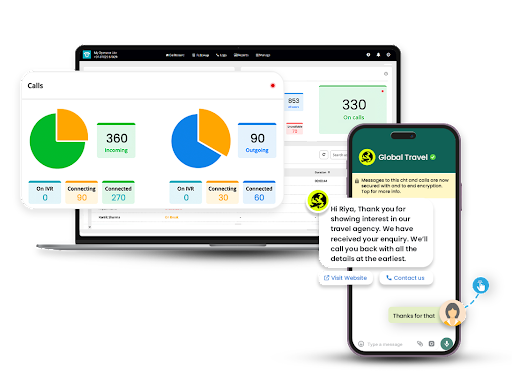
Cloud Contact Center SaaS, also known as CCaaS (Cloud Contact Center as a Service), refers to a software delivery model where contact center functionalities are provided as a service over the internet.
In this model, businesses can access and utilize a complete contact center solution hosted in the cloud, without the need to invest in and maintain their own infrastructure.
Cloud Contact Center Software as a Solution (CCaaS) offers a comprehensive set of tools and features required for effective customer interactions across multiple communication channels.
Such features include voice calls, emails, chats, social media, and SMS. The service is typically offered by a third-party provider who manages the underlying infrastructure, software, and ongoing maintenance.
In the realm of business, Software as a Service (SaaS) has become a prominent model for Cloud Contact Centers.
SaaS providers offer contact center software applications that are hosted on their own servers and accessed by businesses over the internet. This eliminates the requirement for businesses to invest in and manage software installations on their local infrastructure.
By adopting a SaaS-based Cloud Contact Center solution, businesses can enjoy several benefits. Firstly, they can bypass the complexities associated with deploying and maintaining software locally, reducing IT overhead and resources.
Instead, the contact center software is readily accessible through standard web browsers, allowing agents and managers to conveniently log in from any location with an internet connection.
For instance, consider a global B2B organization with multiple offices and remote teams.
By utilizing a SaaS-based Cloud Contact Center, their agents located in different regions can seamlessly access the contact center software via web browsers.
This eliminates the need for on-site software installations and allows agents to work remotely or from various office locations.
Cloud Call Center software’s default flexibility promotes agile and efficient customer service, enabling businesses to respond swiftly to customer inquiries irrespective of geographic boundaries.
Moreover, the SaaS model offers scalability and flexibility, accommodating businesses with fluctuating call volumes or seasonal demands.
For example, during peak seasons or promotional periods, a B2B company may experience a surge in customer inquiries.
With a SaaS-based Cloud Call Center, the organization can easily scale up their operations by adding more user licenses or accessing additional features. Thus ensuring sufficient resources are available to handle the increased call volume.
Additionally, the SaaS model often includes regular software updates and maintenance provided by the SaaS provider.
This ensures that the contact center software remains up-to-date with the latest features, enhancements, and security patches without the need for businesses to manage these updates internally.
CCaaS frees up resources and allows businesses to focus on their core competencies, while the SaaS provider takes care of software maintenance.
To suffice, the SaaS model in Cloud Contact Centers empowers B2B organizations to leverage contact center software applications without the burden of local installations and maintenance.
It provides remote accessibility, scalability, and hassle-free software updates, facilitating efficient and flexible customer service operations.
On-premise Call Center Vs Cloud Contact Center
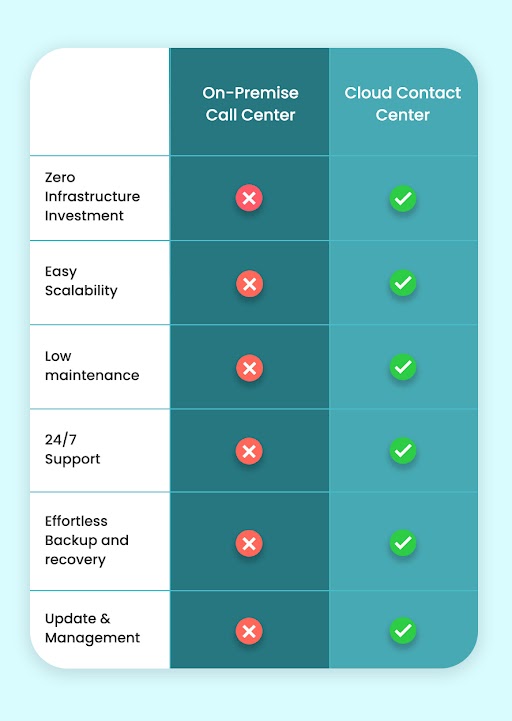
| On-premise Call Center | Cloud Contact Center |
| Require significant upfront investment in infrastructure, including servers, telephony systems, and hardware equipment. | Eliminate the need for upfront infrastructure investment. They operate on a subscription-based model, allowing businesses to pay for services as needed. |
| Scaling an on-premise call center can be challenging and time-consuming. It requires additional hardware and resources to accommodate increased call volumes or agent capacity. | Cloud contact centers offer seamless scalability. Businesses can easily adjust capacity, add or remove agents, and scale operations based on fluctuating call volumes or business requirements. |
| On-premise call centers offer limited flexibility as they are confined to a physical location. Remote work or agent mobility can be difficult to implement without complex setups and additional costs. | Cloud contact centers enable flexible work options, including remote and distributed teams. Agents can access the contact center platform from anywhere with an internet connection. |
| Maintaining and updating on-premise systems is the responsibility of the business. Key jobs include managing software patches, security updates, and hardware maintenance. | With cloud contact centers, service providers handle maintenance, updates, and system upgrades. This ensures that businesses always have access to the latest features and enhancements without the need for extensive IT involvement. |
| On-premise call centers face a higher risk of data loss and downtime in the event of a natural disaster or system failure. Implementing comprehensive disaster recovery plans can be complex and expensive. | Cloud contact centers provide robust disaster recovery capabilities. Data is stored securely in the cloud, with redundant backups and failover systems in place. 100% Data recovery is assured. |
Best Use Cases of Cloud Contact Center
Cloud Contact Centers offer numerous use cases providing valuable solutions to streamline operations and enhance customer service. Some key use cases of Cloud Contact Centers include
- Customer Support and Service
- Sales and Leads Generation
- Account Management and Upselling/Cross-Selling
- Technical Support and Help Desk
- Order Management and Fulfillment
- Vendor and Supplier Support
- Multichannel Communication
- Account Based marketing
VoIP-based Cloud Contact Center – The Best CCaaS To Amplify Your Business
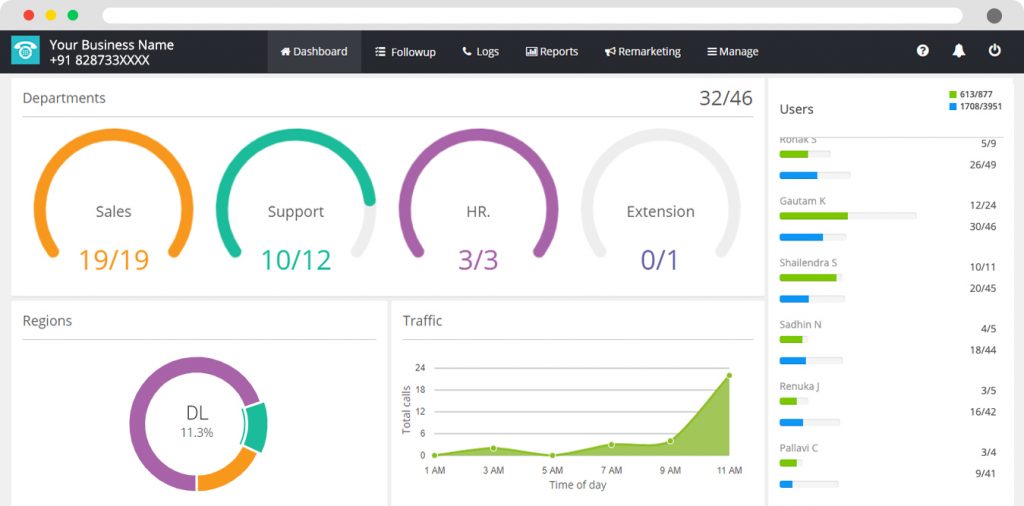
Touted as India’s leading CCaaS provider and trusted by 10,000+ business, MyOperator’s Cloud Contact Center+VoIP service bolsters businesses to amplify business communication at scale with omnichannel integrations.
With MyOperator, businesses can combine the power of AI, Voice and WhatsApp on one contact center to create a transcendental customer experience culminated with award winning support, flexible user-based pricing and omnichannel integrations.
MyOperator Cloud Contact Center + VoIP offers
- Call Management
- Integration
- Campaign management
- Reporting & Scalability
Call Management
a) Advanced IVR
Interactive Voice Response (IVR) is a technology that allows callers to interact with an automated system using voice or keypad inputs. Advanced IVR refers to a more sophisticated implementation that goes beyond simple menu options. With this feature, you can set up multi-level IVR, which means creating multiple levels of menu options to guide callers through a series of prompts and actions.
b) VoIP-enabled
Voice over Internet Protocol (VoIP) enables the transmission of voice calls over the internet instead of traditional telephone lines. Having VoIP-enabled software means that your contact center can leverage web-calling capabilities, where callers can make calls directly from a web browser or application.
c) Omni-channel Integrations
Omni-channel integrations allow you to integrate voice workflows with other communication channels to provide a seamless and consistent customer experience across multiple platforms. For example, integrating WhatsApp bots and SMS (text messaging) with your voice workflows enables customers to interact with your contact center using their preferred channels.
d) Smart Mobility
Smart Mobility refers to the ability to access contact center functionalities and make/receive calls on mobile devices, catering to a hybrid, mobile-first world. With a mobile-based dialler suite, your agents can use their smartphones or tablets to handle calls while on the go.
Maximize the power of real-time communication
Discover Exclusive Offers on WhatsApp
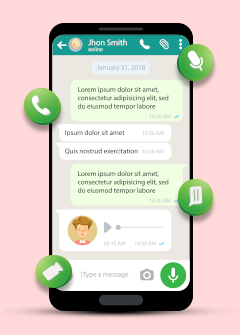
1. Smart Chat & Chatbots
Implement a chatbot that requires no coding to respond to queries and automate workflows. This reduces reliance on human agents and improves efficiency. MyOperator’s WhatsApp Chatbot Ultimate Guide will help you can read, understand, and set up your chatbots to amplify your customer support..
2. Multiple Live Chat Users
The feature of having multiple live chat users allows several team members to simultaneously handle customer support inquiries on the same whatsapp business contact number.
Multiple agents can engage with customers in real-time, increasing efficiency, reducing response times, and providing better customer service by distributing the workload among the team members.
3. Custom Integrations
With custom integrations, you can connect WhatsApp with your CRM, ERP suites, or custom workflows through a smart API framework. This integration allows for smooth and seamless communication between platforms, ensuring that data is synchronized across systems.
4. Campaign Management
Create omni-channel campaigns that combine WhatsApp bulk messaging, voice broadcast, SMS, and missed calls. These campaigns can be tracked and analyzed through reporting dashboards, providing valuable insights into campaign performance.
Integrations
a) CRM Integration
Integrate your customer relationship management (CRM) system with our platform to enhance sales and customer service processes. Our advanced partner programs enable seamless integration with popular CRM platforms like Freshworks, Zoho, and Leadsquared, saving costs and improving efficiency.
b) No-code Workflows
Create automated workflows without the need for coding using our Zapier integration and open AI framework. This empowers you to automate repetitive tasks, streamline processes, and improve productivity.
c) Truecaller for Business
Increase call pick-up rates by using a verified business number through Truecaller for Business. This feature enhances credibility and trust, leading to better customer engagement and improved call connections.
Campaign Management
1. WhatsApp Business API
Enhance brand engagement by 10 times by leveraging the WhatsApp Business Account to manage conversations and campaigns. This allows businesses to interact with customers on a popular messaging platform, providing a seamless and convenient communication channel.
2. SMS Campaigns
Drive sales and customer engagement through SMS campaigns. Send transactional or promotional messages to reach your target audience effectively, leveraging the widespread use and high open rates of SMS.
3. Voice Broadcasting
Run automated voice call campaigns with the exclusive voice broadcasting feature. Reach a large number of contacts within seconds by broadcasting pre-recorded voice messages, enabling effective communication and outreach.
4. Missed Call Campaigns
Conduct interactive campaigns with high conversion rates using the missed call feature. By allowing callers to give you missed calls, you can initiate further engagement, capture leads, or provide information based on the missed call response.
Drive Results with Efficient Campaign Management

Reporting and Scalability
a) AI-powered Analytics
Monitor essential business metrics using real-time customizable reports. This feature allows you to track team performance, analyze customer sentiment, and measure campaign effectiveness, providing valuable insights for data-driven decision-making.
b) Security Compliant
MyOperator’s cloud contact center prioritizes data security and compliance. It is ISO/IEC 27001:2013 certified, ensuring maximum protection and adherence to industry-standard security protocols.
c) Fail-safe Servers
MyOperator guarantees business continuity with fail-safe servers. Multiple geo-redundancy measures are in place to ensure high availability, with a 99.9% uptime guarantee, minimizing any potential disruptions to your contact center operations.
Case Studies: How Emerging Brands are Scaling with Cloud Contact Center Service
1. Brand: Lenskart
Lenskart, a prominent player in the Indian eyewear industry, offers a diverse range of eyeglasses, sunglasses, and contact lenses. With its headquarters situated in New Delhi, the company boasts an extensive network of 580 stores spread across 70 cities in India.
Given the widespread popularity of Lenskart’s products, their staff receives a substantial volume of calls from customers nationwide. Managing such a high call volume would prove challenging with a traditional phone system, particularly considering the brand’s extensive marketing efforts across various channels and the consequent influx of leads.
To address this issue, Lenskart sought an advanced automation solution to streamline their call handling processes and alleviate the burden of manual call handling on their frontline professionals.
The MyOperator Solution
The integration of MyOperator into Lenskart’s CRM brought a fresh approach to communication by providing unique virtual numbers for each of its 580 stores.
Lenskart aimed to establish a seamless connection between its customers and their nearest store. With MyOperator’s cloud call center solution, the incoming calls to the virtual numbers assigned to each store are directed to the respective store specialists. In the event that a call goes unanswered at the store, it is automatically rerouted to Lenskart’s centralized staff, ensuring minimal instances of missed calls.
With the implementation of MyOperator, Lenskart supervisors gained access to a comprehensive dashboard that facilitates recording, reporting, and tracking of all 580 virtual number India in one place. This centralized system enhanced their ability to monitor and manage customer interactions effectively.
Here are the results
- 30% increase in their marketing RoI due to detailed reporting & recording of calls generated from different marketing channels.
- 40% increment in customer calls received which otherwise were getting missed due to traditional phone numbers
- 10X increase in efficiency and productivity of customer-facing professionals due to less manual call handling/transferring
- 10X increase in their on-call connect time between customer and their concerned professional owing to automatic call routing
- 20% rise in their on-call business closures after executing the MyOperator solution.
How Lenskart Achieved 10x More Efficiency in Customer Support

2. Brand – Internshala
Internshala is one of the most sought-after companies for empowerment opportunities across the country. To cater to the constant influx of enquiry calls Internshala opted to use traditional landline and mobile phones for their customer communication.
However they were fraught with two major challenges
- Missing out several important customer calls which particularly impacted their customer calling experience.
- Unable to attend multiple calls simultaneously nor could ensure 24*7 availability for their callers.
MyOperator Solution
As a perpetual solution to the aforementioned challenges, MyOperator provided Internshala with a full-fledged setup comprising features like Virtual phone number that facilitates attending multiple calls simultaneously.
In addition, an IVR system was integrated to inform the clients of non-availability of agents and assure them of a callback. The call management solution also has a call tracking and recording feature that helps the organization to monitor agents’ performance and ensure an upgraded customer calling experience.
The future market of Call Center Software holds immense potential for growth and innovation. AI-powered virtual assistants, automation, predictive analytics, advanced omnichannel experiences, IoT integration, enhanced security, and AR/VR technologies will drive the evolution of cloud contact centers.
By harnessing the power of the cloud, businesses can achieve higher efficiency, improved customer satisfaction, and sustainable growth in today’s dynamic and competitive marketplace.
Embracing cloud contact center technology is not just a trend; it is a strategic imperative for organizations seeking to elevate their customer service capabilities and stay ahead in the industry.
Customer management plays a pivotal role in big businesses as it directly impacts customer satisfaction, loyalty, and retention.
By understanding customer needs, preferences, and expectations, businesses can tailor their products, services, and experiences to meet customer demands effectively.
Clear and efficient communication ensures seamless coordination among teams, departments, and stakeholders, enabling smooth workflow and collaboration. It fosters a unified vision, enhances productivity, and minimizes errors or misunderstandings.
Big businesses require big, effective advancements to up the game and stay ahead of the curve.
MyOperator offers such holistic Cloud Contact Center + VoIP service to create a functional ecosystem for businesses aiming to evolve through seamless communication, enhanced customer management, and optimized operations.
By leveraging the power of cloud technology, advanced features, and reliable VoIP services, MyOperator empowers big businesses to elevate their customer experiences, streamline processes, and drive growth in today’s competitive market.
Additionally, MyOperator also provides a toll free number and call center software for your business and levels up your customer support services to achieve better customer satisfaction.
How Internshala improved customer calling experience with MyOperator


